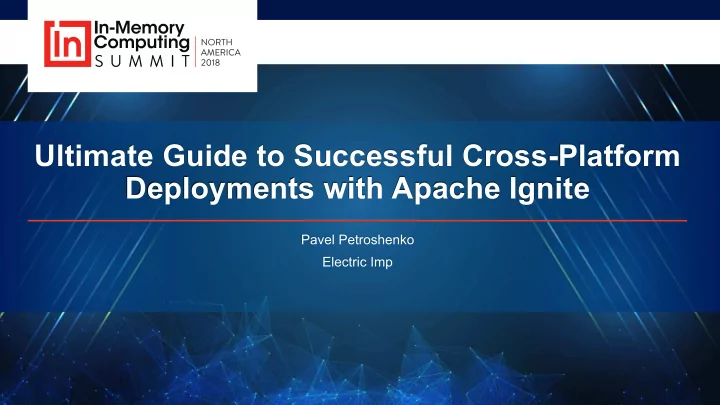

Ultimate Guide to Successful Cross-Platform Deployments with Apache Ignite Pavel Petroshenko Electric Imp
Agenda • Apache Ignite Clients • Data interoperability in Ignite • Binary Client Protocol • Cross-platform deployment demo 2
Clients and Servers • Server nodes • Participate in caching • Compute jobs execution • Stream processing • etc. • Client nodes • Provide ability to connect to server nodes • Client nodes are primarily used to run Native (aka Thick) clients 3
Native (aka Thick) Clients • Have access to the full set of the Ignite APIs • Near caching • Transactions • Compute • Streaming • Services • etc. • Require the server nodes to exist in the topology • Server mode discovery can weaken this requirement • Other requirements to keep in mind • Client application should handle reconnects (can have a new ClusterNode id) • Server should manage the outbound traffic to the “slow” clients 4
Thin Clients • Connect to clusters via a socket connection • Connects to a specific “proxy” server node • Sends all cache requests to the proxy, which re-routes data to the right server • Does not require a client node to be run • Does not become a part of the topology • Can’t run the compute jobs • Use the Binary Client Protocol for communication with server nodes • Can be implemented in any programming language • Thin Clients to be released in Apache Ignite v2.7 • C++ • Node.js • Python • PHP 5
Data Interoperability BinaryObject format • BinaryObject – cross-platform format for objects serialization • Allows for arbitrary field access from serialized form - No need to have key/value type implementations on the server side • Allows to dynamically modify object structures - Might be useful to support multiple object type versions • Allows to construct objects based on type name - Dynamic type construction • Supports SQL queries • BinaryObject Limitations • Fields or types with the same name hash are not allowed - Applicable to all the levels of class hierarchy • Only default binary marshaller can be used 6
Binary Objects: Best Practices • Zero Downtime Principle • No need to keep object classes on the server nodes thanks to the binary format • Use BinaryObjectBuilder and BinaryObject wrappers to access data on the servers • Reduce Space Consumption With Serialization Tuning • Use BinaryRawWriter for more compact fields serialization, if you don’t need them in the SQL requests – footprint optimization 7
Binary Thin Client Protocol • Allows Thin Client applications to interact with a cluster • Application connects to a “proxy” server node via a socket connection • Connectivity issues should be handled on the client side • Defines the format of client-server connection handshake • Verification that client and server versions match • Credentials exchange and authentication (optional) • Defines the format of data/messages • Little-endian byte ordering • Header and body format • Request and response format • Is based on the BinaryObject format for data representation • Keys, values, complex objects 8
Binary Client Protocol (cont.) • Client operations • Key-Value operations • SQL and scan queries - Scan with filters may be limited at this point • Binary-type operations • Cache configuration operations 9
Cross-Platform Deployment Demo • Apache Ignite cluster running on an AWS instance • 4 different platforms share the same data set • Real-time data pushed from the Electric Imp Explorer Kit • Data processing with sample PHP, Python and Node.js Thin Client applications • Cross-platform and Cross-APIs operations • Key-value primitive type put/get • Complex binary objects manipulation 10
Demo Architecture Node.js Thin Client Electric Imp Explorer Kit PHP Thin Client Humidity Raw Data Processed Data REST AWS Cloud Temperature Python Thin Client 11
Thank You! Questions? 12
Useful Links • https://apacheignite.readme.io/docs/clients-vs-servers • https://apacheignite.readme.io/docs/binary-marshaller • https://apacheignite.readme.io/docs/binary-client-protocol • https://apacheignite.readme.io/docs/thin-clients • https://apacheignite.readme.io/docs/rest-api • https://developer.electricimp.com/hardware/resources/reference- designs/explorerkit 13
Recommend
More recommend